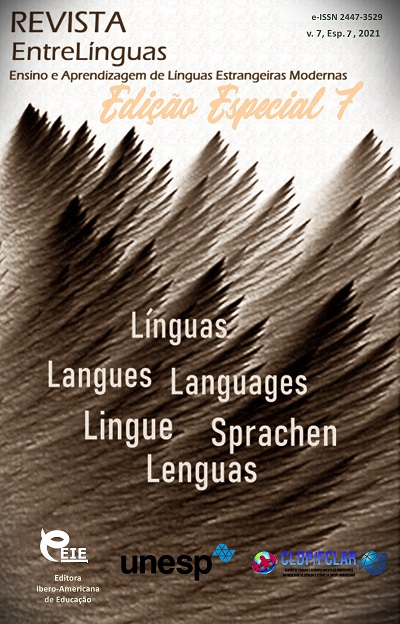A relação entre as múltiplas inteligências dos aprendizes e o sucesso na aprendizagem de uma segunda língua
DOI:
https://doi.org/10.29051/el.v7iesp.7.16332Palavras-chave:
Inteligência múltipla, Aprendizagem de uma segunda língua, Alunos, LinguagemResumo
Uma das necessidades humanas essenciais que podem garantir o sucesso em várias áreas da vida é a inteligência. Devido à importância desta questão, o pesquisador da teoria da inteligência múltipla selecionou Howard Gardner como uma das principais teorias da inteligência como pesquisa e estudou seu papel no sucesso da aprendizagem de uma segunda língua e dois fatores cruciais da linguagem (gramática e escrita ) a nível acadêmico. O estudo tem como objetivo analisar o papel das inteligências múltiplas dos alunos na aprendizagem de uma segunda língua. Para isso, 120 alunos de universidades russas participaram deste estudo. Sua seleção foi aleatória. A pesquisa é correlacional e descritiva, e estatística inferencial, teste t para amostras independentes e análise de variância (ANOVA) e software SPSS foram usados para analisar os dados. Os resultados mostraram uma relação positiva e significativa entre alguns componentes da inteligência e da aprendizagem de uma segunda língua.
Downloads
Referências
Benedict Kingsbury. (2019). Infrastructure and InfraReg: on rousing the international law 'Wizards of Is'. Cambridge International Law Journal, 8(2), 171, 172.
Eriashvili, N.D. (2017). Banking law: a textbook for university students studying "Jurisprudence", "Finance and Credit". - 9th ed., Rev. - M.: UNITI-DANA, - 615 p.
Federal Law No. 395-1 of 02.12.1990 "On Banks and Banking Activities" // Code of Laws of the Russian Federation. - 1996. - No.6. - p.492.
Helmut Aust. (2017). 'The System Only Dreams in Total Darkness': The Future of Human Rights Law in the Light of Algorithmic Authority. Forthcoming in German Yearbook of International Law, 60. URL: https://papers.ssrn.com/sol3/papers.cfm?abstract_id=3130043 (accessed date 05.06.2020).
Kamalian, V.M. (2019). Legal risks of using digital technologies in banking. Actual problems of Russian law, 6, 32-39. URL: https://cyberleninka.ru/article/n/pravovye-riski-ispolzovaniya-tsifrovyh-tehnologiy-v-bankovskoy-deyatelnosti (accessed date 05.06.2020)
Kartskhia, A.A. (2019). Civil law model of regulation of digital technologies: Author's abstract, Cand. Law. M., - p. 4.
Khabibullina, A.Sh., Seleckaya, S.B., Shpagonov, A.N. (2019). The problems of robotisation of legal profession. Periódico do Núcleo de Estudos e Pesquisas sobre Gênero e Direito Centro de Ciências Jurídicas - Universidade Federal da Paraíba, 8(6), 397-405.
King, В. (2013). Bank 3.0: why banking is no longer somewhere you go, but something you do. – Singapore: Marshall Cavendish Editions. [Rus. ed.: B. King. Bank 3.0. Why banking is no longer somewhere you go, but something you do. - M.: Olymp-Business, 2014].
King, В. (2018). Bank 4.0: Banking everywhere, Never at a Bank – Singapore: Marshall Cavendish Editions [Rus. ed.: B. King. Bank 4.0: New financial reality - М.: Olymp-Business, 2020].
Passport of the national project "The "Digital Economy of the Russian Federation" National Program" (approved by the Presidium of the Council under the President of the Russian Federation for Strategic Development and National Projects, Minutes dated 04.06.2019 No. 7). URL: http://static.government.ru/media/files/urKHm0gTPPnzJlaKw3M5cNLo6gczMkPF.pdf (accessed date 05.06.2020).
Pertseva, S.Iu. (2018). Digital transformation of the financial sector. Innovations in management, 18, - P.52.
Sadyrzhanov, B.E. (2018). Development of digital technologies in the activities of commercial banks. Scientific notes of young researchers, 3, - p.52.
Shpagonov, A.N., Khabibullina, A.Sh., Rodionova, O.M., Kolodub, G.V. (2019). Digital Formalization and Russian Cyber Laws. Helix, 9(5), 5463.
The Decree of the President of the Russian Federation No. 204 of May 7, 2018 "On the Strategy for Economic Security of the Russian Federation until 2024" // Code of Laws of the Russian Federation. - 14.05.2018. - No.20, p.2817.
Zeynep Tufekci. (2014). Engineering the public: Big data, surveillance and computational politics. First Monday, 19(7).
Downloads
Publicado
Como Citar
Edição
Seção
Licença

Este trabalho está licenciado sob uma licença Creative Commons Attribution-NonCommercial-ShareAlike 4.0 International License.
Os manuscritos aceitos e publicados são de propriedade da Revista EntreLínguas. Os artigos publicados e as referências citadas na Revista EntreLínguas são de inteira responsabilidade de seus autores.
Transferência de direitos autorais – autorização para publicação
Caso o artigo submetido seja aprovado para publicação, já fica acordado que o(s) autor(es) autoriza(m) a UNESP a reproduzi-lo e publicá-lo na EntreLínguas, entendendo-se os termos “reprodução” e “publicação” conforme definição respectivamente dos incisos VI e I do artigo 5° da Lei 9610/98. O artigo poderá ser acessado pela rede mundial de computadores (Internet), sendo permitidas, a título gratuito, a consulta e a reprodução de exemplar do artigo para uso próprio de quem a consulta, desde que haja a citação ao texto consultado. Essa autorização de publicação 328 EntreLínguas, Araraquara, v. 1, n .2, p. 323-328, jul./dez. 2015 não tem limitação de tempo, ficando a UNESP responsável pela manutenção da identificação do(s) autor(es) do artigo. Os artigos publicados e as referências citadas na Revista EntreLínguas são de inteira responsabilidade de seus autores.











